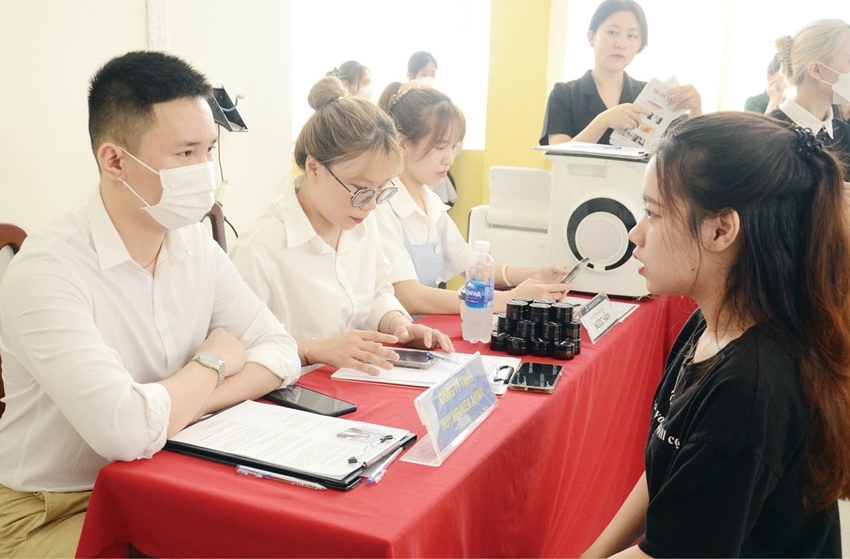 |
| Enterprises recruit workers at the career fair of the University of Economics, Hue University in 2023 |
Carelessness may create a “photocopier”
As of August 2023, the University of Economics, Hue University has associated and cooperated with about 100 domestic and foreign corporations in training and transferring science and technology, and supplying human resources. This has brought simultaneous benefits to all parties, especially students.
As at the two career fairs held by the university in 2023, 56 businesses participated and recruited 1,750 job positions. Each student has many opportunities to work at enterprises that the university have contracted to provide training services before.
Or at the University of Agriculture and Forestry, Hue University, this year’s job fair attracted more than 37 businesses to recruit more than 2,700 job positions; in which, 5 enterprises recruited with an unlimited quantity. Meanwhile, the number of graduates is just over 1,000 students. Eventually, each graduate has 2.7 job opportunities on average.
According to Dr. Nguyen Cong Hao, Head of the Department of Training and Student Affairs, Hue University, in terms of training institutions, the joint training between universities and enterprises is an objective need, originated from the interests of both sides. In the process of construction and development, Hue University identifies that enterprises will play an important role as an information provider for training institutions to understand the needs of the labor market. Since then, appropriate training programs will be developed with an orientation to the needs of the society and enterprises.
Accordingly, over the past time, member universities and faculties of Hue University have cooperated with many partners to improve their training qualities, expand career opportunities for students, and provide the society with qualified human resources.
From the perspective of enterprises, constant fluctuations of the market with updated and constantly changing knowledge of the human resources, it is necessary for them to have a good and capable human resource to complete any of their tasks to be able to overcome those difficulties. Therefore, enterprises must also be more proactive in coordinating with institutions to train, re-train and update knowledge on economics, business administration, and soft skills for labor resources. Updated information and new regulations of the State on changes in economic management policies are also required.
The training according to businesses’ needs has proven its effectiveness. However, in a more multifaceted approach, Prof. Dr. Le Dinh Phung, Vice Rector of the University of Agriculture and Forestry, Hue University said that the joint training with enterprises ensured jobs for students. The percentage of graduates having good jobs would bring positive effect to universities in promoting their enrollment attractions.
Yet, training according to businesses’ needs also has two sides, especially for the fields of science and technology. Many businesses only want students to study and do well in one field. This can lead to stereotypes; in which, students can only go through certain processes, and lack creativity. If the screening in enterprises is increasing, workers who are trained in the above-mentioned model will become disadvantageous as they move to other working environments.
 |
| Training according to businesses’ needs helps students find jobs easily after graduation |
Developing appropriate programs
The orientation of training high-quality human resources is the goal of all training institutions. This quality is confirmed by enterprises. To shorten the gap and meet the needs, enterprises must be an important “link” in training programs.
According to experts, training programs that are designed specifically for enterprises and follow their needs, will demonstrate a clear understanding of the current situation and characteristics of their production and business, their current situation of human resources, their target trainees and training requirements. Depending on the requirements of enterprises, it is possible to apply new knowledge from training programs.
Dr. Nguyen Cong Hao said that regulations on developing training programs in universities were very open today. In some training majors, such as tourism, economics, information technology and so on, enterprises can involve in up to 30% of the full-course training program.
On the other hand, current training institutions are also very flexible in developing their training programs. One program will not be applied to all. However, the training institution will constantly change the programs to suit the reality. In this process, enterprises and training institutions will “fully cooperate” to build a suitable program. How enterprises get involved in training more or less depending on the agreement of the two parties.
Businesses now focus on recruiting a person who can hold many different positions in an enterprise. Therefore, many comments suggest that training institutions need to coordinate with businesses to create a business environment right in the institutions. Specifically, students can study in this room, move to the next room with a working environment of enterprises, then to next room with a practice environment... With such a learning environment, students will have 4 years of experience in their 4-year programs, and gain enough experience to enter a business upon their graduation.
Ms. Ngo Thi Ngoc Lan, a labor and employment expert, Director of the Northern region of Navigos Search Vietnam shared, many businesses believed that it took only 15 days to train a worker to do a good job, yet 6 - 8 months to train an engineer who can work well after graduation. To change this, institutions should not wait until the last year to organize internships for students. They should allow their students to start to learn and work at enterprises from the first year. They will learn not only practical knowledge, but also integration skills and businesses’ thinking as soon as possible.
